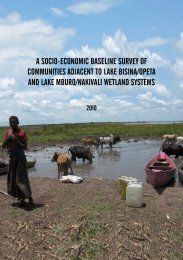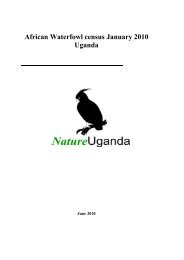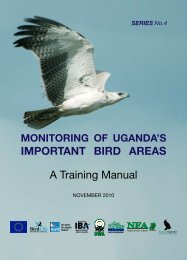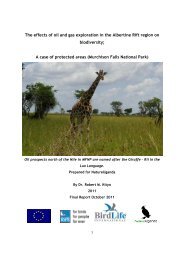A Ecological Baseline Surveys Of: - Lake Bisina - Nature Uganda
A Ecological Baseline Surveys Of: - Lake Bisina - Nature Uganda
A Ecological Baseline Surveys Of: - Lake Bisina - Nature Uganda
You also want an ePaper? Increase the reach of your titles
YUMPU automatically turns print PDFs into web optimized ePapers that Google loves.
freshwater/riverine sites (lowest, 70ppm in River Rwizi Wetland). The progressive drop in TDS from<br />
upstream sites as the water flows through papyrus swamps shows that the wetlands are performing<br />
an important ecological function of sequestering ions from the water. The differences in conductivity<br />
and TDS between Nakivale and Mburo systems probably shows little or no hydrological connection<br />
between the two lakes or the dilution effect of the Rwizi waters on <strong>Lake</strong> Nakivale is negligible.<br />
Dissolved oxygen was much lower in the <strong>Bisina</strong>- Opeta compared to the Mburo-Nakivale system.<br />
It ranged from 3.03 to 7.23 mg/l in the <strong>Bisina</strong>-Opeta and 6.3 to 9.9 mg/l in the Nakivale - Mburo<br />
system. The differences in dissolved oxygen might have important implications for the aquatic biota<br />
found in the two wetland systems. Thus productivity could be lower in the <strong>Bisina</strong>-Opeta system<br />
compared to the Nakivale-Mburo system. Casual observations on the fish catches on some landing<br />
sites of the two wetland systems showed that fish sizes were larger on the Mburo-Nakivale system<br />
than on the <strong>Bisina</strong>-Opeta.<br />
Turbidity was estimated visually from the color of water. Generally waters of the <strong>Bisina</strong>-Opeta<br />
system were much clearer than that of Mburo-Nakivale which was mostly turbid ranging from dark<br />
to greenish colour. The dark colour of the Rwizi water may be attributed to the high concentrations<br />
of humic acids as a result of decomposition in the papyrus swamps and the fact that the river drains<br />
an agricultural watershed upstream. The greenish colour of Mburo-Nakivale waters is likely a result<br />
of high concentration of phytoplankton in the two lakes.<br />
Cluster analysis (Fig 1) shows a clear separation of sites based on their physicochemical<br />
characteristics. Three major clusters were evident and they included the <strong>Bisina</strong>-Opeta complex,<br />
The Rwizi Mburo system that also clustered with the River Sironko site were characterized by low<br />
conductivity, low water temperatures and low TDS. The last cluster composed of <strong>Lake</strong> Nakivale<br />
sites and its tributary sites characterized by relatively high conductivity. The separation of sites/<br />
wetland types based on the measured physicochemical parameters is proof that the variables can<br />
be used as indicators of wetland condition. That is, by measuring water quality, one is able to gauge<br />
the conservation status of a wetland as the variables are likely to change with wetland modification<br />
or degradation. Apart from anthropogenic impacts, the fundamental controls of background water<br />
quality are climate, geology, soils, topography and biota (Petts & Amoros 1996).<br />
7.4 Conservation Implications<br />
The water catchments of the two wetland systems are impacted to different levels by human activities.<br />
For example, River Sironko that drains into the Opeta system is highly turbid from agricultural<br />
activities implying that if conservation measures aimed at maintaining or improving water quality<br />
in the wetlands are to be implemented; these efforts should not be restricted to wetlands systems<br />
only but should also take into consideration the upstream sources of the water. The Mburo-Nakivale<br />
system catchment appears to be better conserved than the <strong>Bisina</strong>-Opeta system as the most of<br />
the shoreline has been converted to pastureland in the latter. Several fishermen talked to on both<br />
wetland systems reported receding water levels in the lakes. Thus, a timely intervention to reverse<br />
or slow down this negative trend is recommended especially with the threat of global warming.<br />
Further research in the areas of phisiacal and chemical nature of the water in both wetland systems<br />
is required such that concrete interventions can be sought.<br />
104<br />
<strong>Ecological</strong> <strong>Baseline</strong> <strong>Surveys</strong> of <strong>Lake</strong> <strong>Bisina</strong>, <strong>Lake</strong> Opeta, <strong>Lake</strong> Mburo and Nakivali Wetlands Systems









